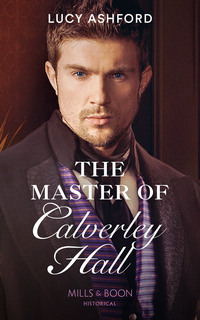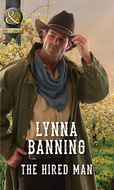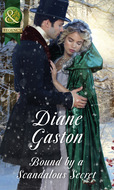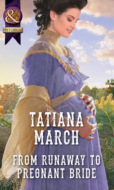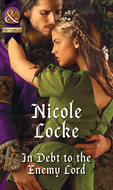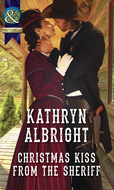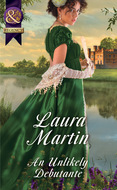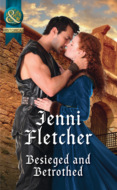Książki nie można pobrać jako pliku, ale można ją czytać w naszej aplikacji lub online na stronie.
Czytaj książkę: «The Master Of Calverley Hall»
“So, you’re back.”
But can he put her world to rights?
It should have been Connor Hamilton’s final triumph to return to Calverley Hall as its master, rather than the poor blacksmith’s boy he once was. He’s shocked to find that the previous owner’s daughter, his old friend Isobel Blake, has lost everything, including her good reputation. Now the fragility beneath her shabby clothes and brave smile makes him want to protect her and hold her close...
“Ashford creates charming characters.”
—RT Book Reviews on The Rake’s Bargain
LUCY ASHFORD studied English with history at Nottingham University, and the Regency is her favourite period. She lives with her husband in an old stone cottage in the Derbyshire Peak District, close to beautiful Chatsworth House, and she loves to walk in the surrounding hills while letting her imagination go to work on her latest story.
You can contact Lucy via her website: lucyashford.com.
Also by Lucy Ashford
The Major and the Pickpocket
The Return of Lord Conistone
The Captain’s Courtesan
The Outrageous Belle Marchmain
Snowbound Wedding Wishes
The Rake’s Bargain
The Captain and His Innocent
Discover more at millsandboon.co.uk.
The Master of Calverley Hall
Lucy Ashford

ISBN: 978-1-474-07383-7
THE MASTER OF CALVERLEY HALL
© 2018 Lucy Ashford
Published in Great Britain 2018
by Mills & Boon, an imprint of HarperCollins Publishers 1 London Bridge Street, London, SE1 9GF
All rights reserved including the right of reproduction in whole or in part in any form. This edition is published by arrangement with Harlequin Books S.A.
This is a work of fiction. Names, characters, places, locations and incidents are purely fictional and bear no relationship to any real life individuals, living or dead, or to any actual places, business establishments, locations, events or incidents. Any resemblance is entirely coincidental.
By payment of the required fees, you are granted the non-exclusive, non-transferable right and licence to download and install this e-book on your personal computer, tablet computer, smart phone or other electronic reading device only (each a “Licensed Device”) and to access, display and read the text of this e-book on-screen on your Licensed Device. Except to the extent any of these acts shall be permitted pursuant to any mandatory provision of applicable law but no further, no part of this e-book or its text or images may be reproduced, transmitted, distributed, translated, converted or adapted for use on another file format, communicated to the public, downloaded, decompiled, reverse engineered, or stored in or introduced into any information storage and retrieval system, in any form or by any means, whether electronic or mechanical, now known or hereinafter invented, without the express written permission of publisher.
® and ™ are trademarks owned and used by the trademark owner and/or its licensee. Trademarks marked with ® are registered with the United Kingdom Patent Office and/or the Office for Harmonisation in the Internal Market and in other countries.
Version: 2020-03-02
MILLS & BOON
Before you start reading, why not sign up?
Thank you for downloading this Mills & Boon book. If you want to hear about exclusive discounts, special offers and competitions, sign up to our email newsletter today!
Or simply visit
Mills & Boon emails are completely free to receive and you can unsubscribe at any time via the link in any email we send you.
For Alan
Contents
Cover
Back Cover Text
About the Author
Booklist
Title Page
Copyright
Dedication
Chapter One
Chapter Two
Chapter Three
Chapter Four
Chapter Five
Chapter Six
Chapter Seven
Chapter Eight
Chapter Nine
Chapter Ten
Chapter Eleven
Chapter Twelve
Chapter Thirteen
Chapter Fourteen
Chapter Fifteen
Chapter Sixteen
Chapter Seventeen
Chapter Eighteen
Chapter Nineteen
Chapter Twenty
Chapter Twenty-One
Epilogue
Extract
About the Publisher
Chapter One
Gloucestershire—June 1816
Seven years ago, Connor Hamilton had vowed to turn his back for good on the English countryside. But today, as he felt the warm summer sun on his face and breathed in the scent of freshly mown hay, he realised he’d never actually forgotten how beautiful it could be.
He’d chosen to drive from the Hall in his phaeton, with nine-year-old Elvie sitting at his side and Tom, the elderly groom, perched on the back. His two matched bays set a smart pace along the road to Chipping Calverley, but as their destination grew closer Connor reined them to a walk and took a swift glance down at Elvie. Not that he could see a great deal of her, thanks to that huge sunbonnet her grandmother had insisted the child wear.
‘I promise I’ll bring her back in one piece, Laura,’ Connor had teased.
‘I know! I know I’m fussing!’ Laura had laughed. But then she’d added, more quietly, ‘You realise, Connor, how very much my granddaughter means to me.’
An unspoken grief coloured her words and Connor had replied, ‘Of course. She means a great deal to me also.’
Poor Elvie. Poor silent, orphaned Elvie. But she was taking everything in, Connor was sure, with quiet pleasure. And suddenly the little girl tugged at the sleeve of his driving coat and whispered, ‘Look, Connor. There’s a fair!’
She was pointing to the colourful tents set out on a grassy meadow in the distance, the spaces between them already thronged with people and stalls. ‘A fair?’ he echoed teasingly. ‘Never, Elvie. Surely not.’
‘But there is, Connor. There is.’
Connor pretended to lean forward, shading his eyes from the bright sun. ‘Do you know,’ he said, ‘I think you’re quite right.’
She didn’t say another word, but she gazed intently at the bustling scene as they drew closer. And Connor thought, Pray God I’ve done the right thing, bringing the child here. Meaning not just to the fair, but to Calverley, to the very place where he himself had grown up, the place he had turned his back on all those years ago. Thus, in all likelihood, opening himself up to all sorts of memories and regrets...
Concentrate, he told himself sternly, because by now his horses had come to a complete halt in the solid queue of carriages, gigs and carts all heading for the fairground. Connor turned round to his groom. ‘All right if I leave you in charge, Tom, while I walk on with Elvie?’
‘All right indeed, sir,’ said Tom, lowering himself remarkably promptly for a man of his age from the rear of the carriage. ‘You two go and enjoy yourselves, now!’
No one could have been more pleased than old Tom when Connor had arrived at Calverley Hall back in April and told him he was going to buy the place. Its former owner had died five years ago, owing money everywhere; the bank had taken possession and put the run-down Hall up for sale. No buyers appeared. Instead, a succession of tenants had done nothing to reverse its general decline and few of the staff from the old days remained.
But now Connor was the new master of Calverley. ‘Well,’ Tom had said when he heard the news, ‘I was thinking of retiring, to be honest. But since you’re back—if you need a fellow to run your stables, Mr Hamilton, then here I am!’ He’d puffed out his chest. ‘It will be an honour working for you, sir!’
And if Tom was recalling how Connor grew up the son of the local blacksmith, and had laboured every day in the heat of the forge, then old Tom said nothing at all.
Now Connor handed the reins to him, then went to help little Elvie down. ‘It’s a bit of a walk, Elvie,’ he told her. ‘But you don’t mind, do you?’
‘Oh, no.’ She gripped his hand tightly.
‘Good girl,’ he approved and noted how her eyes were round with wonder as he guided her through the lively crowds. So, he thought to himself, people still came from miles around to the midsummer fair at Chipping Calverley. ‘It’s the prettiest village in Gloucestershire,’ people always used to say. ‘With the best fair in the whole of the county!’
And he was finding that every sound, sight and scent brought back memories. The appetising smell from the stall selling fresh bread. The music of the Morris Men with their fiddles and their bells. The laughter of the crowd watching the Punch and Judy show. You didn’t see many smiles on the faces of London’s businessmen, thought Connor. Not unless they’d just made a vast profit in some big financial deal—and even then, their smiles were only half there, because their brains were already busy counting up the money.
Talking of money, those creatures in the livestock pens had to be worth a fair amount. He steered Elvie towards where the farmers stood proudly by their animals and the crowds pressed against the enclosures to get a better view.
‘Look, Elvie. See the calves?’ He lifted the little girl up high to get a better view of the cows with their young ones and—firmly chained to a stout post—the muscular black bull that gazed balefully at the awestruck crowd. Elvie gasped in delight, then they moved on because a little way past the cattle enclosure Connor had spotted some colourfully dressed gypsies offering pony rides. He saw Elvie gazing at them. ‘Do you want a ride?’ he asked her gently.
She hesitated and shook her head; he thought he glimpsed uncertainty in her eyes.
‘Perhaps another time, then,’ he said. ‘Yes?’ And she nodded.
Maybe I ought to get her a pony of her own, Connor mentally noted. A small one, a gentle one. It will give her something to take care of. Perhaps even help her, in a small way, to get over her father’s death.
Connor, too, missed Miles Delafield. The older man had been not only his business partner, but his close friend. Miles would have loved all this, he thought suddenly. He gazed around and realised that if you looked beyond the fairground and up the valley, you could actually see Calverley Hall on the far side of the river. From here you got a heart-stopping view of its acres of gardens running down to the water meadows; of its gabled roofs and diamond-paned windows sparkling in the June sun.
And now—all of it belonged to him. What talk there must have been, when the locals heard he was moving in. What speculation about the money he had made. And if he’d hoped to make his appearance here at the fair unnoticed, he was mistaken, because he was finding himself hailed in hearty greeting by landowners and businessmen who wouldn’t have acknowledged his existence in the old days. They came up to him one after another, declaring, ‘We must get together soon, Hamilton! It’s good to see you back, hopefully to restore the Hall to its former glory. You’ll come round for dinner soon?’
And then there was the local Vicar, the Reverend Malpass. Malpass ran a small school for the children of the deserving poor, which Connor had briefly attended before being thrown out for hiding a frog in the Vicar’s desk.
Did Malpass remember? Surely he did—but he was almost painfully effusive in his attempts to welcome Connor home. ‘Mr Hamilton, it’s truly excellent news that you’ve moved into Calverley Hall. I remember you well—and I’m sure that you’re exactly what the place needs!’
Connor gazed at him, dark eyebrows slightly raised. ‘I remember you, too, Reverend Malpass. And I can see that you’ve hardly changed in the slightest.’
The Vicar hesitated. Frogs? thought Connor. Was he thinking of frogs? Then Malpass, clearly shrugging aside the past, beamed down on Elvie. ‘And this young lady is your relative, is she? Charming. Charming, I’m sure. How do you do, miss?’
‘I—I’m very well, sir.’
That stammer again. Connor felt Elvie shrink against his side and he gripped her hand. ‘She’s not my relative,’ he stated flatly. ‘Miss Elvira Delafield is the daughter of my former business partner.’
‘Ah, yes. Miles Delafield—he died recently of a heart attack, didn’t he? And I hear this poor little girl’s mother is dead, too—most, most unfortunate!’
Connor felt Elvie press closer. He’d always thought the Vicar was a blundering fool. ‘Indeed,’ he replied tersely. ‘Now, if you’ll excuse us...’
But no sooner had Connor got away from the Vicar than he found himself surrounded by a fresh hazard—women.
Oh, the women. Not just the young ones eyeing him up from beneath their beribboned straw bonnets, but their mothers, too, were coming at him from all sides. ‘My dear Mr Hamilton!’ they simpered one after another. ‘We’re truly delighted that you’ve returned to Gloucestershire. We do hope we’ll have the privilege of your company soon...’
And they proceeded to recite a list of church committees, fund-raising fêtes and parish entertainments that all sounded extremely worthy—but he knew, of course, what the tabbies were really thinking.
They would be thinking that Mr Connor Hamilton, at twenty-five years old, was an extremely wealthy man. Had risen from being a blacksmith’s son to partner in a highly successful iron business—and now that his partner had conveniently died, he’d got the lot. What was more, he was the new owner of the most impressive house in the district by far—a family home if ever there was one, even if it was somewhat neglected—and he was not married!
Connor endured just a few more moments of the mothers parading their daughters, but he was heartily glad to be distracted by Elvie tugging at his hand. ‘Connor,’ she was whispering. ‘Connor, look.’
He looked and realised there was some sort of disturbance over by the crowded ale tent. A cluster of children, none of them older than Elvie, were racing around and he thought he could hear a small dog yapping. There were adult voices as well now, raised in anger and in threat.
Connor, with Elvie’s hand still in his, drew closer. The children looked underfed and scruffy—he immediately guessed they were from the gypsy caravans that came every summer to set up camp in Plass Valley, half a mile from here. Their parents would be busy harvesting the hay and the children, he realised, were chasing after a puppy whose rope leash trailed after it. They dived to catch it, failed and tried again, shrieking with laughter as the excited puppy evaded them.
Local people didn’t like the Plass Valley children, Connor remembered. Local people didn’t like their parents much, either, despite the vital work they did on the farms in summer. The children’s appearance didn’t help, since judging by the mud splashes on their clothes and bare skin they’d all taken a dip in the nearby duck pond.
And so, evidently, had the puppy. Droplets of water were still flying from its fur as it shook itself, causing nearby ladies to shriek as their best frocks were bespattered, while their menfolk blustered. One burly man caught a little lad by the ear. ‘You young varmint, you and your kind should be beaten out of here. And I’ll—’
He broke off when Connor stepped forward. ‘The child’s rather small for your threats, don’t you think?’
‘I’ll bloody thump him, that’s what! Plass Valley vermin!’
‘Try thumping me instead,’ invited Connor.
Connor was tall and his well-tailored clothes couldn’t hide the fact that he was extremely well muscled into the bargain. The man hesitated, muttered something under his breath and vanished into the staring crowd. And then Connor heard another voice, a young woman’s voice, saying calmly but firmly, ‘Children, you really shouldn’t let your puppy get so excited. He thinks it’s all a game—he doesn’t understand that you’re trying to catch him.’
Connor could see her now. Tall and slender, in her early twenties, she wore an old-fashioned cotton sunbonnet and a flowery frock—a frock now generously splashed with mud, since she’d picked up the excited puppy and was holding it firmly in her arms.
One of the children—a freckle-faced lad in a battered cap set at a jaunty angle—called out to her, ‘We didn’t mean any trouble, miss! He went swimming in the duck pond and got stuck in the weeds. So we pulled him out, but then he ran away.’
‘But here he is—fortunately,’ she said. The puppy was trying to lick her face with its pink tongue. ‘Perhaps you’d better take him home and get yourselves cleaned up.’
The children looked at one another. ‘But he’s not ours, miss.’
‘Not...?’
‘He’s a stray,’ explained the lad. ‘We found him this morning up in the fields, really hungry, so we fed him and asked around. No one wants him. And he’s not wanted at home, either, at our camp, ’cos our dads say we’ve got enough dogs already.’
‘Well,’ she said. ‘Well.’
And Connor felt the memories surge and connect, rolling into place one after another. The young woman wore country clothes that were clearly homemade and years out of fashion; yet she carried herself with grace and spoke with unusual clarity. And more memories began to pile in. Far too many of them.
Then someone else arrived—that blasted Vicar, Malpass. ‘Best keep yourself out of this, young lady,’ he said curtly to the woman, looking almost with repugnance at the muddy puppy in her arms. ‘As for you,’ he declared, turning to the children, ‘how dare you run wild here, disturbing the peace and up to no good? Be off with you!’
Connor was about to stride forward and intervene, but the children had a defender already.
‘I’ve spoken to the children, Vicar,’ she said, still apparently calm, ‘about this little dog. He was in difficulties in the pond and they were trying to help him. Is that really so bad of them?’
The Vicar clearly thought it was. ‘You know their kind. They’re no better than their parents, living like vagrants, thinking they’re beyond the power of the law. And they never attend the church!’
‘Perhaps they don’t attend your church,’ the woman said steadily, ‘because they realise how unwelcome they’ll be.’
And her intervention—was this what she’d intended? Connor wondered—had given the children the chance to escape, scampering through a gap in the hedge and off into the neighbouring fields. Connor stepped forward, Elvie’s hand still in his, and said to the Vicar, ‘It seems there’s no harm done, Reverend Malpass. But I think we all need to remember that these children’s parents are vital to the summer harvest. Don’t we?’
The Vicar pursed his lips. ‘Of course, Mr Hamilton. But we still need to maintain basic standards of morality in the district.’ And—with a curt nod of the head—the Vicar moved on.
If Connor had been wise, he’d have moved on, too, but he didn’t.
Everyone else had drifted away, back to the ale tent or the food stalls or the livestock pens—but the young woman remained. She was still soothing the puppy, which had settled gratefully into her arms, and Connor noted that despite her slenderness, she certainly possessed her share of womanly curves. Swiftly he lifted his gaze to her face and saw that her eyes were as intense as ever—green flecked with gold and fringed by thick dark lashes...
Then he realised she was meeting his gaze steadfastly. And she said, ‘So you’re back.’
The little dog whimpered in her arms, as if suddenly uneasy. And Connor, too, was unsettled, was not quite sure how to handle this. Calmly would be best. He nodded. ‘Indeed, Miss Blake,’ he replied. ‘I’m back and you are still—how can I put it?—managing to find yourself in the thick of things.’
He thought he glimpsed a faint flush tinge her cheeks. But she lifted her chin and said, ‘In the thick of things? If that’s how you choose to see it, then, yes. It’s a habit of mine, perhaps an unfortunate one, but one I can’t appear to break.’ She met his gaze mildly, though he thought he glimpsed a pulse of agitation in her throat. ‘And I’ve heard, of course,’ she went on, ‘that you’ve bought Calverley Hall. Now, that is what I’d call a spectacular way of returning to the area where you grew up and I offer my hearty congratulations.’
He felt his breath catch. Just for a moment he’d gone back in time, gone back seven years in fact. He was the blacksmith’s son, and Isobel Blake, then sixteen years old, had been heiress to Calverley Hall and all its supposed wealth. He said, ‘I would hardly go to the trouble of buying the place purely to make an impression, Miss Blake.’
The puppy wriggled a little; she stroked it, murmuring a calming word, then turned her clear green gaze on Connor again. ‘Wouldn’t you? Oh, but I would. If I were you.’ Then she was dipping him a curtsy that was almost mocking and saying, ‘With your permission, Mr Hamilton, I’ll move on. I have certain purchases to make.’
‘You’re keeping the puppy?’ He’d stepped forward impulsively. ‘But how on earth are you going to look after him?’
Almost without realising it, he’d put his hand on her arm. The flowery frock she wore was short-sleeved and a jolt ran through him at the warm softness of her honey-gold skin. She looked at his hand and then at him, so he was able to see how her eyes flashed with some new emotion—anger? Swiftly he removed his hand and waited for her answer.
‘Do you think,’ she said levelly, ‘that I’d leave him to starve?’
‘No. But I had heard that you’ve fallen on hard times.’
‘I’m not destitute. I do work for my living.’
His mouth curled. ‘I’d heard that, too.’ He saw her catch her breath; she knew exactly what he was thinking.
‘Mr Hamilton,’ she said politely, ‘I’m disappointed in you. Once, you advised me never to heed the tattle of gossipmongers—’
And then she broke off, because the puppy had scrambled from her arms and was scurrying away, its rope leash trailing. ‘Oh,’ cried Elvie, ‘catch him, he’s escaped!’
And Connor suddenly realised that for a moment or two he’d almost forgotten little Elvie, because his past had come surging up to engulf him. Isobel Blake had come into his life again.
Not for any longer than I can help, he vowed to himself.
Elvie had already set off after the puppy, as had Isobel, but Connor quickly overtook them both with his long strides, then scooped the creature up and held it out to Isobel. She was forced to come close and he found himself breathing in her scent. Lavender, he remembered, she always loved lavender...
‘My thanks,’ she said. Holding the puppy firmly, she was clearly about to turn and go without another word. But then she became aware of Elvie, who was gazing longingly at the little creature.
‘He’s lovely, isn’t he?’ she said to her, in a completely different tone of voice to the one she’d used to him, Connor noted. ‘Would you like to stroke him? That’s it. He likes you. He trusts you.’
‘Do you know,’ Elvie said slowly, ‘he’s probably the sweetest thing I’ve ever seen.’ Then she turned to Connor. ‘Connor. Do you possibly think...?’ Her voice trailed away.
Connor said quickly, ‘Elvie, I haven’t forgotten. I said you could have something to care for when we came to the country. A pony, maybe? We talked about it, didn’t we?’
‘But can I perhaps have a puppy instead? One like this, all white and small? Please? I promise, I would look after him so well! I’d feed him and brush him and take him for walks every day!’
And Connor, for a moment, was lost for a reply. Since her father died, Elvie had rarely spoken more than a few words at a time, even to her grandmother and Connor. There was that stammer, too. The doctors in London had pronounced it was a result of shock and grief. ‘Give the child time,’ they suggested, ‘and perhaps a change of scene. Even so, it could take many months for her to recover. To react normally to her surroundings, and to other people.’
And yet here she was—still chatting to Isobel Blake!
‘Do you think, if I had a small puppy like this one, that he would want to walk very far?’ Elvie was asking Isobel eagerly. ‘Do you think he’d mind being on a leash? And would he eat the same food that Connor’s big dogs eat?’
‘Goodness me,’ he heard Isobel say with amusement, ‘how many dogs has Connor got?’
‘Oh, at least six. He likes big dogs very much, you see. But I would love a little one, like this...’ Her voice trailed away longingly.
Connor broke in, very carefully. ‘Elvie, the puppy is in the care of this lady. Her name is Miss Blake.’
Elvie said, ‘I’m sorry if I’m being a nuisance, Miss Blake.’ She looked crestfallen.
And then Miss Blake—Isobel—was saying to Elvie, ‘You are very far from being a nuisance. In fact, you may have this puppy, if you wish. I think he would be very happy at the Hall. But only—’ she glanced swiftly at Connor ‘—if Mr Hamilton agrees.’
Elvie turned to him in an agony of suspense.
‘Impetuous as ever, Miss Blake,’ he said softly.
He saw the flush of colour in her cheeks, but she looked unshaken. Connor met her steady gaze and went on, ‘Nevertheless, I think your idea is a sound one. As Elvie pointed out, I’ve several dogs already—they’re all considerably larger than this small fellow, but he’ll soon make friends. And I promise you he’ll be very well looked after.’
She nodded. Then, very carefully, she handed the small, fluffy creature to Elvie—and as Elvie cradled him, breathless with excitement, the puppy reached up to lick the little girl’s nose. Mud, thought Connor. Elvie’s bound to get mud on her frock. But what did that matter when she looked so happy?
‘Well,’ said Isobel Blake, ‘I had best be on my way. But I’m very glad of the chance to wish you joy in your new abode, Mr Hamilton. Is it a permanent move, I wonder? Or will the Hall just be your occasional country retreat?’
‘I’m not really sure yet. Most of my business is, naturally, in London. But I hope to spend as much time here as possible.’
She nodded. ‘So you won’t be just a summer visitor, then, like the Plass Valley people?’ She gave her bright, challenging smile. ‘Perhaps,’ she went on, ‘if you’re going to be here for a while, you might be able to do something for them?’
He frowned, not at all sure what she meant. ‘Do something for them?’
‘Yes!’ Though her smile was still bright, something in her eyes took him back suddenly to the old days at the forge, when as a girl she used to ride over to watch him at work. The girl from the big house—rich and inquisitive, and, he thought, very lonely.
‘They come here, after all,’ she was saying, ‘to do vital work, yet they are treated like lepers. They need someone to defend them, Mr Hamilton!’
‘Ah,’ he said mildly. ‘So you want me to become a local benefactor? Following the example set by your father, perhaps? I remember the summer when the travellers decided to stay on in their camp for a few days after the harvest was over, but your father set his men on them with dogs and whips—just so they got the message, I think he explained.’
She drew back as if it were she who’d been struck. Very quietly she said, ‘Do you think I’ve forgotten? Don’t you realise I would have stopped it, if I had had any way of doing so?’
‘You’re right,’ he said. ‘I apologise.’ But he saw now that her cheeks were very pale and her breasts rose and fell rather rapidly beneath her thin cotton gown, as if she was struggling to control her emotions.
‘No need to apologise.’ She lifted her head almost proudly. ‘It was I who made a mistake, in even mentioning the subject of the travellers. But—’ and now her voice was light again ‘—permit me to offer you a word of advice, Mr Hamilton. I think you’ll very soon learn that no one around here ever talks about my father.’
She cast one last, almost wistful look at the puppy, then said to Elvie, ‘You’ll take good care of him, won’t you? I feel certain you will.’
‘Oh, yes! And thank you!’ Elvie’s so often sad eyes were shining with delight.
‘What will you call him?’
It took Elvie only a moment. ‘Little Jack!’ she declared. ‘I shall call him Little Jack—do you think that’s all right?’
Isobel laughed again—that merry laugh he remembered so well. ‘I think it’s absolutely perfect.’ She turned to Connor and gave him the slightest of nods. ‘I wish you joy of Calverley Hall.’
And she left.
Darmowy fragment się skończył.
